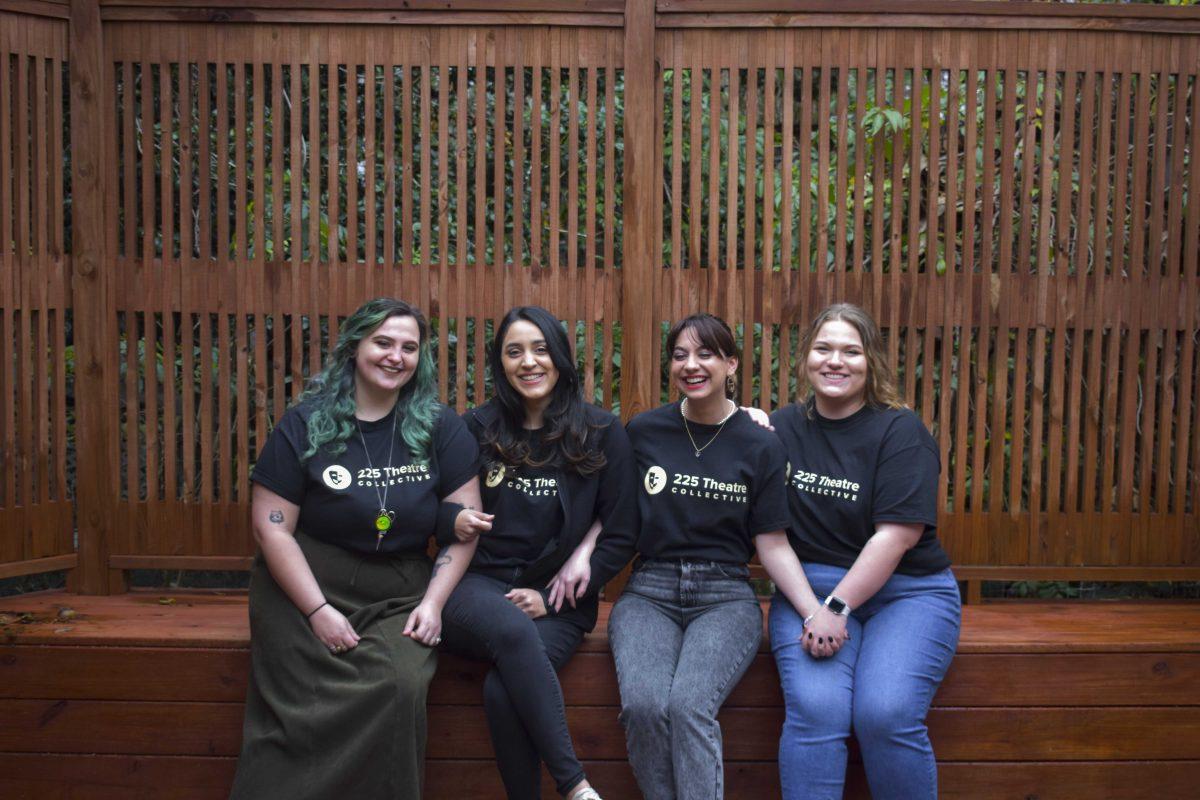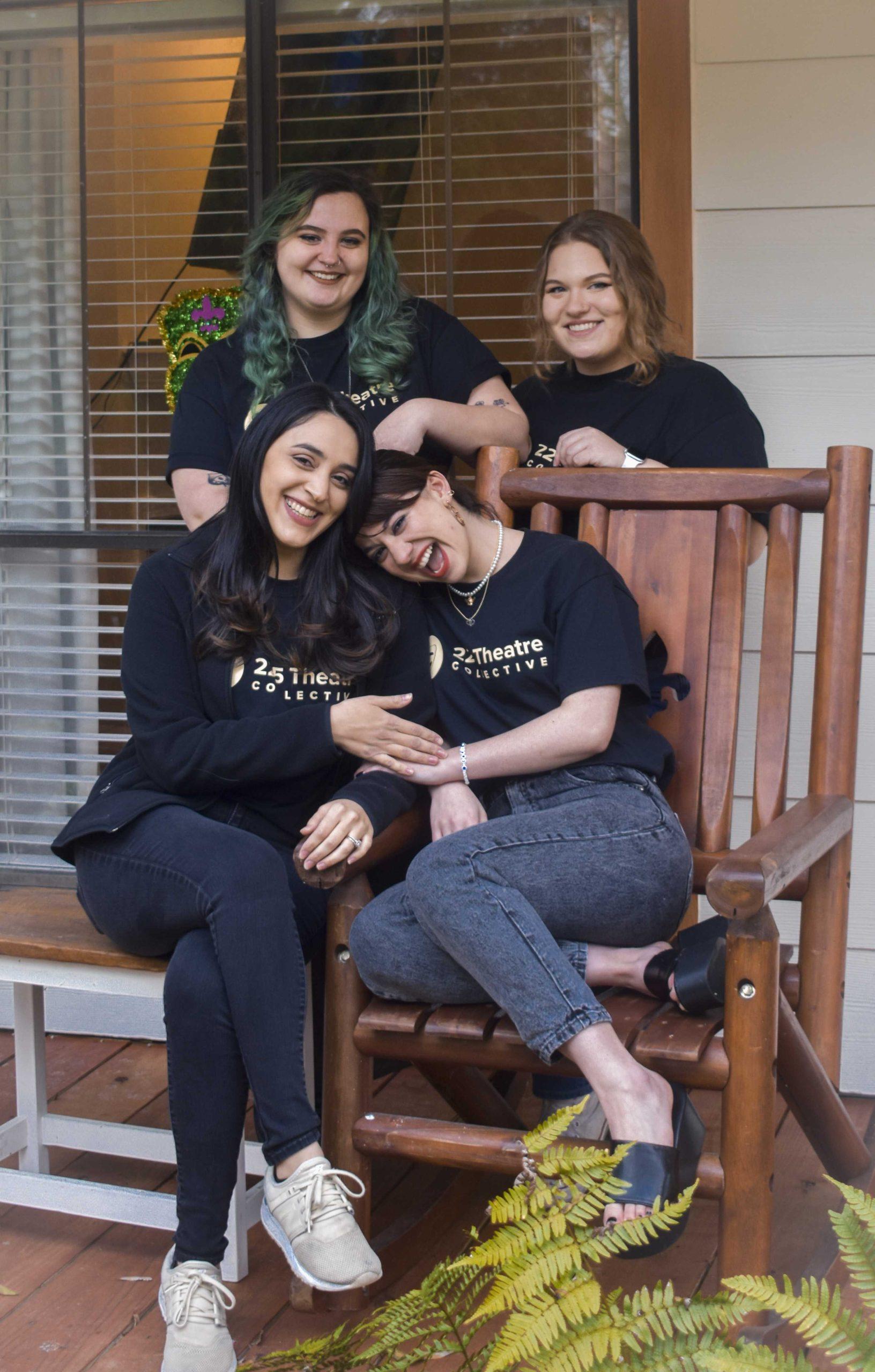The 225 Theatre Collective gives the boot to all antiquated notions of what theatre should look like, one stage production at a time.
It all started with a mom’s group on Facebook. Stephanie Bartage, founder and artistic director of the collective, was disappointed with the limited theatre scene in Baton Rouge after moving here from New Orleans. She remedied this by starting a theatre company of her own and searching for like-minded individuals who shared her passion for performance art.
Bartage posted in a mom’s Facebook group she was a part of, asking if anyone had any experience with theatre. Victoria Brown, current co-founder and head of the company’s costume department, readily answered.
“We clicked instantly,” Bartage said of Brown. “I told her about the plan and the mission, and she was all about it. I’m very grateful to have found her so fast.”
Brown, like Bartage, felt slightly stuck after moving to Baton Rouge. She came here from Georgia in 2020, right as COVID-19 was beginning to rear its ugly head.
“I couldn’t find any theatre jobs,” Brown said. “Everybody was filming on skeleton crews for film and television, so it was very limited.”
Luckily, the team came together quickly after Bartage met with the other half of the four-women collective, Jordan Hebert and Ashley Schmid. Hebert, an LSU international studies junior, is the company’s social media manager and performance coach. Schmid, an LSU political science junior, is the technical director and graphic designer.
For all four women running the collective, it was imperative that they create a space where people from all different backgrounds felt they could safely express themselves creatively. Specifically, as a woman of color, Bartage noted that theatre could often be a discriminatory environment where people of color are outcasted.
“It was always very hard for me to get casted in things because of the way I looked, so I didn’t want that for my company,” she said. “Every show that we did, I wanted it to be open casting.”
Bartage would often get nervous before auditions, not because of the audition itself, but because casting directors would toss her aside or typecast her based off her color. Fostering a nurturing environment that encourages people of color to get onstage has helped Bartage take back the narrative and rectify a culture of misrepresentation in theatre.
The collective launched November 2021 and put on its first production, a stage reading of “The Great Gatsby,” in front of a sold-out crowd at The Guru theater on Jan. 28.
Hebert, tasked with spreading word of the show on social media, tapped into the loyal south Louisiana communities she is a part of to generate some buzz. Her efforts paid off, and soon word about the show had spread all over Louisiana. None of the women could have guessed how big of a reception their performance would receive.
“I knew people would come, but they were so excited,” Hebert said.
With COVID-19 discouraging people from getting out of their houses to enjoy local art, the women were delighted to see so many eager faces in the audience. People were thrilled to support the mission of the non-profit theatre group.
The collective’s production of “The Great Gatsby” brought people of all different backgrounds together, even featuring a working lawyer and mom of three children, Maryanna Broussard, as Jordan Baker. Most of the people cast in the production had no previous theatre experience, but their confidence solidified them as performers.
“It was so rewarding to see everybody’s confidence grow throughout the show,” Brown said. “I remember most of the people that auditioned, auditioned for small roles. We were like, ‘No, we want you as the main roles.’ My heart grew four sizes just watching it.”
For anyone who might be intimidated by the thought of putting themselves out there and acting on a secret desire to try their hand at theatre, the 225 Theatre Collective wants them to know they can join in on their judgment-free haven.
“We’re not seeking the best actors in town; that’s not what we’re doing,” Bartage assured. “If you don’t try it, you’re never going to know.”
When Broussard came in to audition for the production, Brown and Bartage immediately thought she had years of experience under her belt. In reality, it was one of the first auditions Broussard ever did.
“Fake it till you make it,” Brown said. “If you can believe that you’re an actor, if you believe you can do this, you’re gonna fool us.”
While an all-female-owned theatre collective was not intentional, it has made for an immensely empowering and inspiring workplace environment. The typical hierarchical structure that most theatre companies operate on is not how the 225 Theatre Collective runs. No big egos, just women uplifting other women.
“I’m always telling them, ‘This is as much mine as it is yours,’” Bartage said, emphasizing that the group calls itself a collective for a reason.
As a political science major in many male-dominated classes, Schmid knows the difficulty of trying to have her voice heard or her ideas valued in spaces with few to no women. Since she was a freshman in high school doing technical theatre work behind the scenes, men have assumed that she lacked the competence to do her job.
“When I’ve worked with men in the past, even though I’m usually the one in the leadership position, a guy always assumes I’m in less of a role than I am because I’m a woman,” Schmid said.
The group wants to use the power of their combined voices to push the boundaries of Baton Rouge theatre, opening up the community to topics that are considered taboo or uncomfortable.
“It’s important to bring awareness to certain shows that would be kind of scary to try and put on here,” Schmid said.
With the help of the LSU Women’s Center, which has generously allowed the theatre collective to hold meetings and auditions in its facility, the group is hoping to eventually put on a production of the show “Student Body,” which addresses college campus sexual assault.
“It needs to get talked about,” Hebert said. “Everyone knows a woman who bad things have happened to, but ironically, nobody knows men who have done it. There are certain voices that need to speak.”
Even if someone isn’t interested in using acting as a form of advocacy, the members of the theatre collective emphasized that what goes on behind the scenes is just as crucial to amplifying the voices of overlooked and silenced communities.
“There’s something for everyone in the theatre,” Schmid said. “Theatre is all-inclusive, and there is more to it than just acting.”
The collective’s mission of promoting diversity extends to the costume department, the technical work backstage and even the marketing of the productions. In every aspect of the company, they want to support people looking to work in a diverse environment where they can gain experience for a career in the arts.
For the four women at the helm of this collective, their experience working together and with the people who have helped get the company off the ground has been extraordinarily fulfilling.
“I feel so privileged, I feel like I’ve been handed a gift,” Brown said. “You just get this feeling in your chest of like, ‘Oh my god, I’m doing exactly what I want.’ We are giving a platform to people. We are using our talents to bring up issues that need to be talked about. I can show people that this is more than just a little artsy hobby.”
Showing people how rewarding it can be to come together as a community and support others as they grow in their confidence and abilities is precisely the dream Bartage had in mind when she reached out in that Facebook group.
“I just want everyone to get involved,” she said. “Regardless of your experience, just get involved. I want this space to be inviting for everyone. I want them to feel that with everything we do.”








